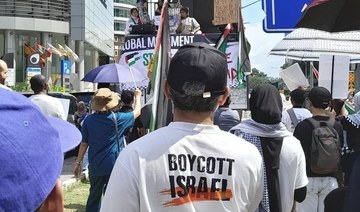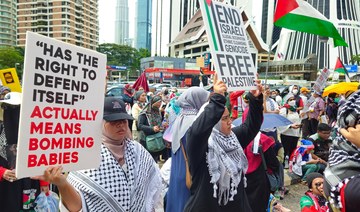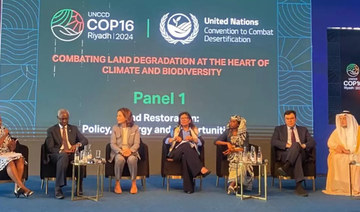KABUL: Afghan President Ashraf Ghani said Saturday the remobilization of the country's armed forces was a "top priority," as Taliban fighters inched closer to the capital after routing the country's defenses over the past week.
The president gave no hint he would resign or take responsibility for the current situation, but said "consultations" were taking place to try to help end the war.
"The remobilization of our security and defense forces is our top priority, and serious steps are being taken in this regard," he said appearing somber and sitting before an Afghan flag in a televised speech.
But Ghani offered few specifics on what his administration was planning as the government's control over Afghanistan has all but collapsed in recent days.
The announcement came as US Marines returned to oversee emergency evacuations from Afghanistan and foreign embassies scrambled to pull out their staff as security deteriorated.
With the country's second and third-largest cities having fallen into Taliban hands, Kabul has effectively become the besieged last stand for government forces who have offered little or no resistance elsewhere.
Insurgent fighters are now camped just 50 kilometers (30 miles) away, leaving the United States and other countries scrambling to airlift their nationals out of Kabul ahead of a feared all-out assault.
Heavy fighting was also reported around Mazar-i-Sharif, an isolated holdout in the north where warlord and former vice president Abdul Rashid Dostum had gathered his virulently anti-Taliban militia.
The only other cities of any significance not to be taken yet were Jalalabad, Gardez, and Khost -- Pashtun-dominated and unlikely to offer much resistance now.
In Kabul, US embassy staff were ordered to begin shredding and burning sensitive material, as the first American troops from a planned 3,000-strong re-deployment started arriving to secure the airport and oversee evacuations.
A host of European countries -- including Britain, Germany, Denmark and Spain -- all announced the withdrawal of personnel from their respective embassies on Friday.
For Kabul residents and the tens of thousands who have sought refuge there in recent weeks, the overwhelming mood was one of confusion and fear.
Muzhda, 35, a single woman who arrived in the capital with her two sisters after fleeing nearby Parwan, said she was terrified for the future.
"I am crying day and night," she told AFP. "I have turned down marriage proposals in the past... If the Taliban come and force me to marry, I will commit suicide."
UN Secretary-General Antonio Guterres said he was "deeply disturbed" by accounts of poor treatment of women in areas seized by the Taliban, who imposed an ultra-austere brand of Islam on Afghanistan during their 1996-2001 rule.
The scale and speed of the Taliban advance have shocked Afghans and the US-led alliance that poured billions into the country after toppling the insurgents in the wake of the September 11 attacks nearly 20 years ago.
Days before a final US withdrawal ordered by President Joe Biden, individual Afghan soldiers, units and even whole divisions have surrendered -- handing the Taliban even more vehicles and military hardware to fuel their lightning advance.
Despite the frantic evacuation efforts, the Biden administration continues to insist that a complete Taliban takeover is not inevitable.
"Kabul is not right now in an imminent threat environment," Pentagon spokesman John Kirby said Friday, while acknowledging that Taliban fighters were "trying to isolate" the city.
The Taliban offensive has accelerated in recent days, with the capture of Herat in the north and, just hours later, the seizure of Kandahar -- the group's spiritual heartland in the south.
Pul-e-Alam, capital of Logar province, was the latest city to fall on Friday, putting the Taliban within striking distance of Kabul.
Helicopters flitted back and forth between Kabul's airport and the sprawling US diplomatic compound in the heavily fortified Green Zone -- 46 years after choppers evacuated Americans from Saigon, signaling the end of the Vietnam War.
The US-led evacuation is focused on thousands of people, including embassy employees, and Afghans and their families who fear retribution for working as interpreters or in other support roles for the United States.
Pentagon spokesman Kirby said that most of the troops shepherding the evacuation would be in place by Sunday and "will be able to move thousands per day" out of Afghanistan.
In his speech Saturday, Ghani said he wanted to end the fighting.
"I have started extensive consultations inside the government with the elders, political leaders, representatives of people, and international partners on achieving a reasonable and certain political solution in which the peace and stability of the people of Afghanistan are envisaged," he said.
Afghan president vows to 'remobilize' forces as Taliban approach Kabul
https://arab.news/z2hrr
Afghan president vows to 'remobilize' forces as Taliban approach Kabul
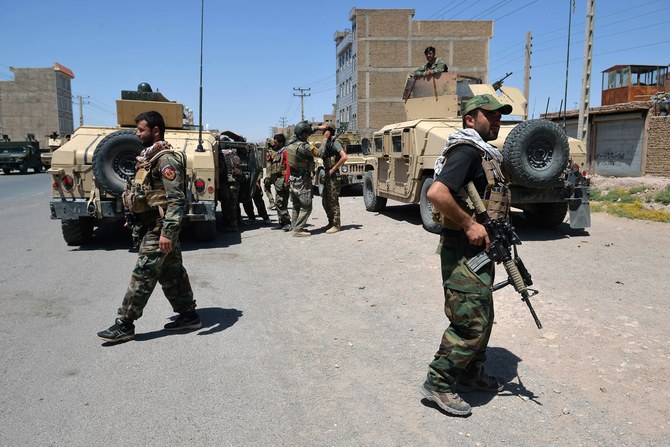
- Ashraf Ghani gave no hint that he would resign or take responsibility for the current situation, though he said 'consultations' were on to end the war
- The Afghan president said he was trying to achieve 'a reasonable and certain political solution in which the peace and stability of the people of Afghanistan are envisaged'
More migrant dinghies cross Channel to England despite Rwanda threat
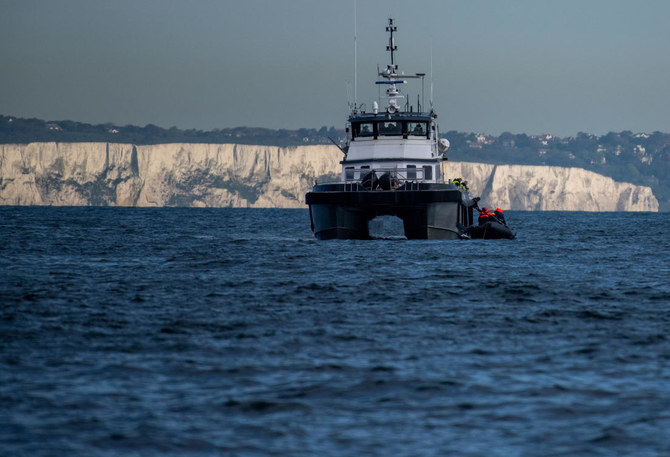
Sunak hopes his flagship Rwanda policy to deport those arriving in Britain without permission to the African nation will deter people from making the Channel crossing
STRAIT OF DOVER: Dozens of people in two rubber dinghies reached the southern coast of England on Saturday, the latest among thousands of asylum-seeking migrants to make the risky sea crossing from France this year.
Bobbing on the waves of the English Channel on a clear morning, the boats sailed across the narrow strip of sea separating France and Britain, with a French naval vessel following them until they reached English waters.
Their largely male passengers, some of whom were in orange life jackets and waving, were taken aboard a British Border Force vessel off Dover.
The arrivals illustrate the difficulties British Prime Minister Rishi Sunak faces on his pledge to tackle illegal migration and “stop the boats,” ahead of a national election expected later this year.
More than 8,000 people have arrived so far this year on small boats, with many fleeing war or famine and traveling through Europe to Britain, making the start of this year a record for such arrivals.
Sunak hopes his flagship Rwanda policy to deport those arriving in Britain without permission to the African nation will deter people from making the Channel crossing. Five people died in the attempt last month.
The government hopes to operate the first flights to Rwanda in 9-11 weeks.
“The unacceptable number of people who continue to cross the Channel demonstrates exactly why we must get flights to Rwanda off the ground as soon as possible,” a spokesperson for Britain’s Home Office said.
“We continue to work closely with French police who are facing increasing violence and disruption on their beaches as they work tirelessly to prevent these dangerous, illegal and unnecessary journeys.”
UK opposition suffers major Muslim vote losses in local elections

- Shadow home secretary: ‘Many people feel really strongly’ about Gaza ‘and rightly’
- Labour MP: ‘It’s not just Muslims. On our doorknocks, we’ve had a lot of middle-class white voters raise it as well’
LONDON: A series of local election victories by the UK’s opposition Labour Party has been overshadowed by a major fall in support among Muslim voters, leading to concern within the party ahead of a general election later this year.
After local elections were held across the country on Thursday, Labour suffered key losses in areas with high Muslim populations due to controversies over the party’s stance on the Gaza war.
Labour must do some “searching” in response to “questions” over its performance, one MP said.
The potential loss of Labour candidate Richard Parker in the West Midlands mayoralty election led to a racism row after an unnamed party source blamed “the Middle East” on deciding the race.
In total, the party gained more than 140 council seats during the elections, The Guardian reported.
But those gains are overshadowed by the potential West Midlands defeat and the Conservative candidate for mayor of London, Susan Hall, running a closer race against incumbent Sadiq Khan than previously expected.
Labour have “trouble brewing on their left flank” after focusing on traditionally rural and whiter areas, said Rob Ford, a politics professor at the University of Manchester.
“There has been a substantial loss of support in heavily Muslim areas and they are going backwards a bit in progressive areas and areas with students. It is progress at a price,” he added.
By offsetting urban losses with gains among rural voters, Labour would win about 34 percent of votes at a general election compared to 25 percent for the Conservatives, the BBC reported.
Yet fear of bleeding urban voters, including Muslims, is driving anxiety in the party ahead of the general election, sources told The Guardian.
“The polls (which predicted a 20-point lead for Khan) were completely wrong, this is going to be much closer than expected,” one source said.
A source in Birmingham, where independent candidate Akhmed Yakoob stood as a spoiler to Labour, said: “Yakoob is picking up over 50 percent in some inner-city wards, so the Gaza impact may be bigger than first estimated.”
Labour also suffered a shock loss in Oldham, losing control of the council after a number of seats were taken by pro-Palestinian independent candidates.
In Manchester, the party lost its deputy leader to a candidate from MP George Galloway’s Workers Party of Britain.
Jess Phillips, Labour MP for Birmingham Yardley, told the “Electoral Dysfunction” podcast in the wake of the vote that the party will have to “wake up and face” the issues that led to losses against independent and Workers Party of Britain candidates.
“I very much expect, as the mayoral votes come in, that in places like Birmingham, Bradford, places with high Muslim populations, as we’ve seen overnight in Oldham, that the Labour Party will have some questions that they have, and some searching to do themselves,” she added, according to Sky News.
Areas with a proportion of Muslim voters higher than 20 percent recorded average losses of 17.9 points for Labour.
The comments by a party source concerning the West Midlands race have led to a post-election race row.
“It’s the Middle East, not West Midlands that will have won (Conservative Mayor Andy) Street the mayoralty. Once again Hamas are the real villains,” the Labour source reportedly told the BBC.
The remarks were condemned by figures including Labour MP Bell Ribeiro-Addy, the Daily Telegraph reported.
“This is a disgusting way to talk about Muslim voters, conflating them with Hamas and treating them as a monolith,” she said. “It reeks of racism and entitlement. Such comments should have no place in the Labour Party.”
According to The Times, MP Zarah Sultana said: “Once again, I’m deeply disturbed by Islamophobic quotes given to the media by ‘Labour sources.’
"When politicians are confronted with racist bile, it should be immediately condemned. As a party we need to listen to and acknowledge concerns, not hold British Muslims in contempt.”
Yvette Cooper, Labour’s shadow home secretary, conceded that the party’s stance on a Gaza ceasefire was “partly” a factor in the surprise defeats.
“Many people feel really strongly about this — and rightly, because tens of thousands of people have been killed, including the majority of them women and children,” she said.
Muslim vote organizers hailed the success of the elections in sending a message to Labour leader Keir Starmer.
Party sources warned that Labour must work overtime to regain the trust of Muslim voters ahead of a general election expected later this year.
“People use local elections to send the government — and sometimes the opposition — a message,” a senior Labour source told The Times.
“The damage is done and even though our position is much better now, if Israel pushes into Rafah people will say we didn’t do enough to urge restraint right at the start.”
A Labour MP added: “It’s terminal with a lot of people, and it’s not just Muslims. On our doorknocks, we’ve had a lot of middle-class white voters raise it as well.”
KFC stores in Malaysia shutter amid anti-Israel boycott

- KFC is not on Malaysian boycott movement’s list, but consumers see it as linked to Israel
- Franchise operator cites ‘challenging economic conditions’ as reason for closures
KUALA LUMPUR: Scores of KFC outlets have closed in Malaysia amid calls to boycott the chain and other brands accused of links with Israel.
Since the outbreak of Israel’s deadly attacks on Gaza in October, many Malaysian citizens have backed a growing refusal to buy products from the Western companies seen as having relations with Tel Aviv.
KFC is among a number of brands that have been reeling from falling revenues, as those who join the boycott movement see them facilitating the Israeli strikes, which have already killed nearly 35,000 people in the Palestinian territory, mostly women and children.
The US-origin fast-food chain has closed more than 100 outlets across Malaysia since October, according to local media estimates.
KFC Malaysia operator QSR Brands Holdings admitted in a statement earlier this week to a temporary closure to “manage increasing business costs,” which it attributed to “challenging economic conditions.”
QSR Brands did not say how many outlets had been closed or if the action was due to a loss in sales caused by the boycott.
The company, which runs over 600 KFC restaurants across the Southeast Asian nation, said staff from affected outlets were given the opportunity to “relocate to busier” stores.
Major companies with international brand names in Malaysia have in recent months reported losses due to the boycott, even if they were not original targets of the action.
In February, the parent company of the US-origin coffee chain Starbucks in Malaysia said the snub by customers led to a near 40 percent drop in revenue. The news followed an earlier claimed loss of profits and job cuts by the country’s McDonald’s franchise.
The anti-Israel boycott in Malaysia has been spearheaded by the local chapter of the global Boycott, Divestment, Sanctions movement. Besides McDonald’s, other popular brands it listed included Burger King, Puma, Airbnb and Pizza Hut.
BDS Malaysia Chairman Mohd. Nazari Ismail told Arab News that KFC was not on the group’s boycott list, but it might be targeted because of its US origins.
“Many Malaysians perceive any American fast-food operator to be related to Israel including KFC,” he said.
“KFC is not on our list because BDS’s strategy is to focus on a limited number of companies to maximize the impact of our efforts. But it is on the list of other organizations that call for boycott of all companies that are related to Israel.”
Many Malaysians who reacted on social media to the news of the outlets closing commented “alhamdulillah,” or “thank God,” with some singling out KFC’s parent company in the US, the American fast-food multinational Yum Brands.
“KFC’s parent company, Yum Brands, invests in Israeli startups,” said X.com user meraungkesepian.
Others targeted the chain’s quality, saying it had fallen off the mark, leading to their shunning of the brand.
“Many have boycotted KFC not 100 percent because of Israel. But because KFC doesn’t have any quality,” said X.com user tonnychua9988 in Malay.
The boycott of KFC was expected, according to Syaza Farhana Mohamad Shukri, associate professor of political science at the International Islamic University Malaysia.
“I think the KFC boycott was inevitable because what is more American than Kentucky Fried Chicken?” she said.
“It is all based on sentiment ... companies that appear to be American-based get the brunt of the people’s anger.”
More than 60 percent of Malaysia’s 33 million people are Muslim, and the country has been fiercely supportive of the Palestinian struggle for decades.
It has no formal relations with Israel and bars Israeli nationals from entering its territory.
In December, Malaysia also barred Israeli and Israel-bound ships from docking at its ports.
Hectoliters of purple ink mark voters in India’s colossal poll

- Ink started to be used in 1962, during India’s 3rd general election
- 2.65m vials of ink produced for the 2024 parliamentary vote
NEW DELHI: Every election in India leaves a mark on its people, not only in political terms, but also literally, in the form of purple stains on their index fingers.
As voters register in booths and have their ID verified to cast ballots, election officers paint a streak of ink across the top of their left index finger, leaving a dark purple stain that usually stays on the skin for more than two weeks.
The exercise started in 1962, during India’s third general election, to prevent fraud and duplicate votes, after the country’s first two polls were marred by complaints of voter impersonation.
One manufacturer was chosen to supply the ink and, as the country’s 18th parliamentary vote is underway, it is still the same one: Mysore Paints and Varnish, from Mysore city in the southern state of Karnataka.
The company was founded in 1937 by the then ruler of Mysore, Maharaja Krishnaraja Wadiyar IV, and became a public sector company after India gained independence from British rule in 1947.
Operated by the Karnataka state government, it is the only company authorized to produce the voter ink.
“From 1962, we have been the exclusive supplier of ink to the election commission of India,” K. Mohammed Irfan, the company’s managing director, told Arab News.
“At that time, Sukumar Sen was the chief election commissioner, and the inventor of the ink is by the name of Dr. Mathur.”
The inventor worked at the National Physical Laboratory, one of India’s earliest national laboratories, and the manufacturing process is based on a guarded chemical formula that has never changed.
“This ink cannot be erased easily,” Irfan said. “It is made of silver nitrate. Once the ink comes into the light it forms bluish and brownish stains, which remain from three days to more than one month.”
More than 968 million people are registered to vote in the world’s biggest election, which started on April 19 and will run in six phases until June 1. The Election Commission has ordered hectoliters of the indelible ink as part of the process.
“For this parliamentary election, we have taken around 80 days to manufacture 2.65 million bottles of ink,” Irfan said, adding that each vial is 10 ml.
“The total cost of manufacturing is 55 crore rupees ($6.6 million).”

Inked fingers are flashed by all those who cast their vote — from Bollywood stars and politicians to common citizens who take pride in being part of elections, which the Indian government usually refer to as “the festival of democracy.”
Shashank Aggarwal, 19, a first-time voter from Noida city, went to the polls on April 26 in the second phase of the vote.
“When the ink got marked on the finger, I felt that I had become part of the festival,” he said. “It felt nice.”
Kapil Sharma, who also voted last week, said that the purple pigment was still clear on his skin.
“The mark is still fresh and has not disappeared,” he said. “I proudly display my inked finger. I don’t mind if it sticks with me for the next five years. It’s a symbol and color of our democracy.”
Pakistan records ‘wettest April’ in more than 60 years: weather agency
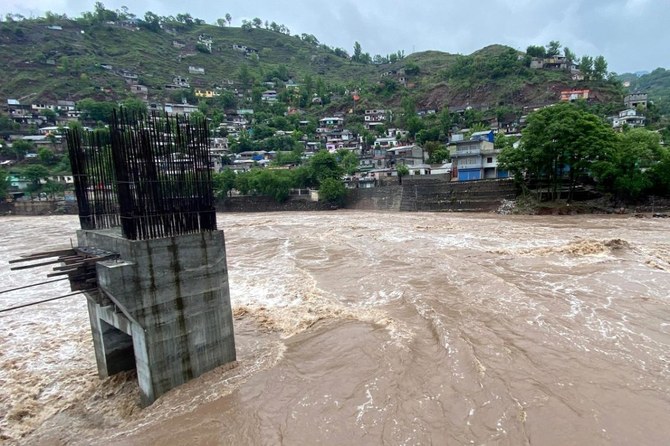
- Pakistan received more than twice as much rain as usual for the month
- Pakistan is increasingly vulnerable to unpredictable weather, as well as often destructive monsoon rains that usually arrive in July
ISLAMABAD: Pakistan experienced its “wettest April since 1961,” receiving more than twice as much rain as usual for the month, the country’s weather agency said in a report.
April rainfall was recorded at 59.3 millimeters, “excessively above” the normal average of 22.5 millimeters, Pakistan’s metrology department said late Friday in its monthly climate report.
There were at least 144 deaths in thunderstorms and house collapses due to heavy rains in what the report said was the “wettest April since 1961.”
Pakistan is increasingly vulnerable to unpredictable weather, as well as often destructive monsoon rains that usually arrive in July.
In the summer of 2022, a third of Pakistan was submerged by unprecedented monsoon rains that displaced millions of people and cost the country $30 billion in damage and economic losses, according to a World Bank estimate.
“Climate change is a major factor that is influencing the erratic weather patterns in our region,” Zaheer Ahmad Babar, spokesperson for the Pakistan Meteorological Department, said while commenting on the report.
While much of Asia is sweltering dure to heat waves, Pakistan’s national monthly temperature for April was 23.67 degrees Celsius (74 degrees Fahrenheit) 0.87 degrees lower than the average of 24.54, the report noted.



